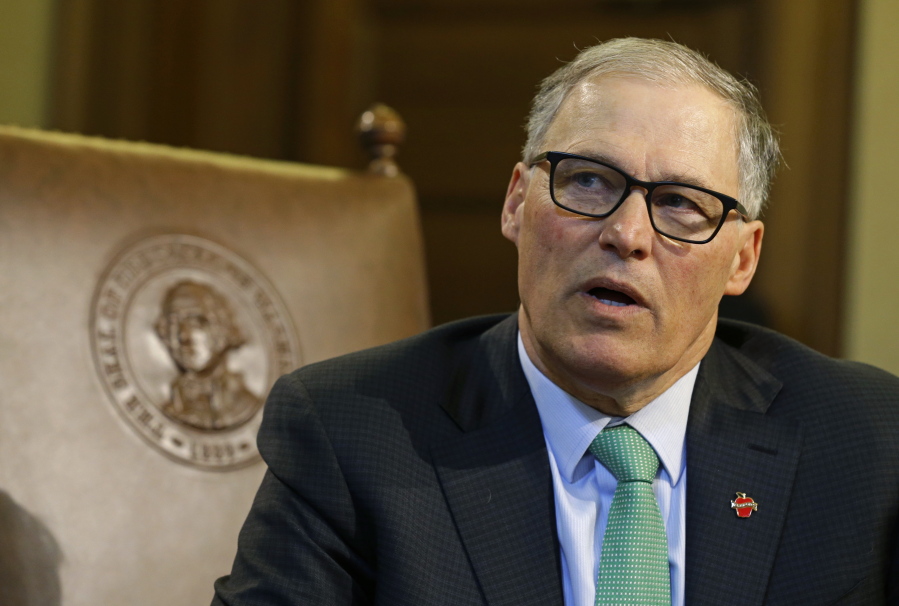The Pacific Northwest has long been united on many fronts. From Vancouver, B.C., to Seattle to Portland, government leaders often reflect their region’s progressive ethos.
Gov. Jay Inslee is hoping someday the cities could be even more connected by a train traveling at speeds faster than 250 miles per hour between Vancouver, B.C., and Portland, with a stop here, connecting the cities’ people, cultures and perhaps most importantly, economies.
Although there’s long been talk of integrating the region by a high-speed rail line, this year the state Legislature has carved out $300,000 in the state’s transportation budget to begin studying the costs and benefits of a new rail system. Private-sector partners, which have not yet been named, are expected to supplement the funding.
“We’re a state of 7.2 million. We’re bigger than Norway, Finland, Denmark. We’re bigger than Ireland. We’re bigger than all those countries; the population and potential ridership show justification for a project like this,” said Charles Knutson, the transportation and economic development executive policy adviser to Inslee. “And what’s unique as well, we have the backing of the Legislature on this study, but also a strong interest from the high-tech sector.”
The governor originally proposed $1 million for the study, but the amount was scaled back by the Legislature. The state’s transportation budget has now passed both the House and Senate and is expected to be signed by the governor. Knutson said the board of directors at Microsoft, along with a broad coalition of business, labor and environmental groups, are also supporting the effort.
The proposed study would consider the economic feasibility, demand for a project, financing options and current compatibility with other existing highway or railroad rights of way. Results are scheduled to be submitted to the Legislature by Dec. 15.
“If anywhere has a market for high-speed rail, that’s us,” said Mark Hallenbeck, the director of the Washington State Transportation Center at the University of Washington. “We have a perfect storm for the market. The distances are right, the sizes of the cities are right, the fact that the three cities have highly intertwined industrial bases, i.e, high-tech groups that like to interact with each other … From those perspectives, it make sense.”
Whether it will make sense from a cost perspective, he added, is less certain. Finding affordable real estate to build the additional rail lines, especially in hot markets such as Vancouver, B.C., and Seattle, could be costly.
The cost-benefit analysis will help determine how long it would take to travel from Seattle to Vancouver, B.C., but a preliminary report determined the 3 1/2 -hour drive would be reduced to less than an hour’s ride. Proponents of the idea are quick to point out how it could ease the affordable housing crunch many of the West Coast cities are facing if a person could live in, say, Chehalis and easily commute to Seattle or even Vancouver, B.C.
The study calls for analyzing a rail line between Vancouver, B.C., and Portland, with station stops in Bellingham, Everett, Seattle, SeaTac, Tacoma, Olympia and Vancouver.
Last year, Inslee and British Columbia Premier Christy Clark agreed to support a “Cascadia Innovation Corridor,” and ultra-high-speed rail emerged from the conference, according to Knutson.
“There’s a growing interest in providing another option and choice for travelers. People are sick of being stuck in traffic,” Knutson said.
It’s currently possible to ride Amtrak between Portland and Vancouver, B.C. There is one through train a day that takes eight to nine hours, depending on the direction traveled. Amtrak also sells train/bus packages, but they aren’t any faster.
This is not the first time Washington has taken a look at high-speed ground transportation. In 1991, the Legislature also directed a comprehensive look into the feasibility of high-speed ground transportation. The study was spurred by congestion on the roads and inspired by well-used high-speed trains in Japan and Europe.
“In summary, if we are to meet the travel needs of our state and region in a manner which supports economic growth and maintains our quality of life and environment, the development of a truly competitive third mode of intercity travel is a must,” the 1992 report states.
The current study will examine how quickly a project of this scale could be realized.
“The No. 1 question we get, interestingly, is ‘What took you so long?’ I think people intuitively understand this and they have experienced this in Europe, which has had high-speed rail since the 1980s, and Japan, which has had it over 50 years … The technology is proven and we’re interested to see if it’s right for Washington state,” Knutson said.
Inslee said he’s pleased the Legislature has made the commitment to study ultra-high-speed rail.
“It’s an opportunity to accelerate economic growth throughout the Pacific Northwest and allow greater movement of commerce, people and culture,” Inslee said in a statement. “In recognition of the benefits it would bring to the entire region, a diverse coalition has come together to support this project. This new connectivity could grow jobs, increase workforce mobility, enable affordable housing options and reduce road traffic.”




